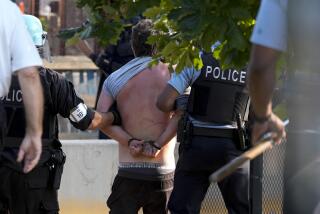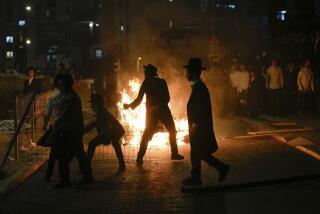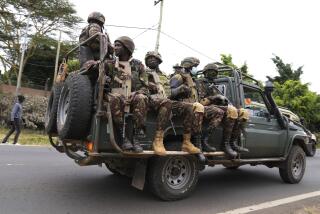In Egypt, Islamists and opposition clash in street battles
CAIRO — Anger between Egypt’s rival political camps erupted into street battles Wednesday after Islamist supporters of President Mohamed Morsi tore down tents belonging to antigovernment demonstrators, raising the possibility of widening violence over the nation’s proposed constitution.
Pro-Morsi factions overran about 200 protesters camped outside the presidential palace in north Cairo. The clashes came after the Muslim Brotherhood’s Freedom and Justice Party called thousands of its members into the streets in a counter-demonstration to drive opposition movements from the presidential palace.
Shoving and punching spilled down a boulevard as hurled stones, swinging sticks and firebombs filled the dusk in one of the capital’s wealthiest neighborhoods. Pro-Morsi contingents, including Brotherhood followers and ultraconservative Salafis, chased opposition activists, shouting: “God is great! The people support the president’s decision!”
More than 200 people were injured across a cityscape that had the charged air of a fluorescent-lit battlefield with competing banners, bandaged men and dinner trays used as shields to block barrages of rocks. Egyptian news reports said clashes spread to other cities, including attacks on several Muslim Brotherhood offices. There were unconfirmed reports of at least three deaths.
Police were slow to react in Cairo but eventually arrived and attempted to separate the two sides, whose skirmishes raised fears that animosity between Islamists and the mainly secular opposition were a dangerous foreshadowing. Both camps threatened marches, and there appeared little compromise in a battle over the nation’s future that symbolizes the larger struggle over political Islam rising from the “Arab Spring.”
“Vicious attack vs. peaceful protesters in front of presidential palace,” tweeted Mohamed ElBaradei, a Nobel Peace Prize laureate and opposition leader. “Regime leading Egypt into violence and bloodshed.”
The clashes exposed new fissures in Morsi’s government from officials disturbed by the power and meddling of the Brotherhood. Three presidential advisors resigned, including Seif Abdel-Fattah, who told the Egyptian news media: “Egypt is bigger than a narrow-minded elite.... We can no longer stay silent because they [the Brotherhood] have harmed the nation and the revolution.”
The defections further marred the credibility of Morsi’s administration at a time when Egypt’s political polarization and continuing unrest have alarmed the international community. The White House, which praised Morsi for his role in negotiating a cease-fire between the militant group Hamas and Israel in the Gaza Strip, is pressing Cairo to calm the crisis.
“Dialogue is urgently needed,” Secretary of State Hillary Rodham Clinton said at a news conference in Brussels on Wednesday. “It needs to be a two-way dialogue, not one side talking at another side, but actual respectful exchanges of views and concerns among Egyptians themselves about the constitutional process and the substance of the constitution.”
Tensions began two weeks ago when Morsi, a former Brotherhood leader, issued a decree that expanded his powers and exempted the Islamist-dominated constitutional assembly from judicial oversight. The country’s highest court was expected to dissolve the assembly, but delegates quickly finished a draft constitution that Morsi ordered be put to a national referendum on Dec. 15.
Opposition factions drew tens of thousands of people who marched on the presidential palace Tuesday to protest Morsi’s authority and the charter, which they say would open the country to Islamic law and a scaling back of civil rights. The demonstration angered the Brotherhood, which on Saturday avoided confrontation with the opposition by holding a massive rally miles away from Tahrir Square, which anti-Morsi movements have made their base.
But the Brotherhood on Wednesday was more aggressive: “The president will not retreat, and if the state apparatus is weakened by the wounds of the previous period, then the people can impose their will and protect legitimacy,” said Essam Erian, deputy head of the Freedom and Justice Party. He called anti-Morsi protesters “thugs who want to depose the elected president.”
The violence was reminiscent of street fights in 2011, when loyalists to then-President Hosni Mubarak attacked peaceful demonstrators in Tahrir Square. The Brotherhood and Morsi fought against the Mubarak elements, but they are now viewed by the opposition as mimicking the authoritarianism of the regime they replaced.
Morsi’s vice president, Mahmoud Mekki, said at a news conference Wednesday that the government welcomed negotiations with the opposition but that the referendum would not be canceled or delayed. The Brotherhood believes it can muster enough votes to get the charter approved and weaken an opposition that is growing stronger in the streets but still lacks a unified political focus.
“No political faction can think that they alone monopolize the opinion and have the majority,” Mekki said. “The judge is the ballot box.”
The opposition has said it will not enter talks with Morsi unless the president rescinds the decree that extended his powers and postpones the referendum. That is not likely to happen. Opposition leaders, such as Hamdeen Sabahi, a leftist, have called for more marches and protests against the government.
ElBaradei said in a news conference that the opposition holds “President Morsi and his government completely responsible for the violence that is happening in Egypt today.”
Special correspondent Gaser El Safty contributed to this report.
More to Read
Sign up for Essential California
The most important California stories and recommendations in your inbox every morning.
You may occasionally receive promotional content from the Los Angeles Times.











